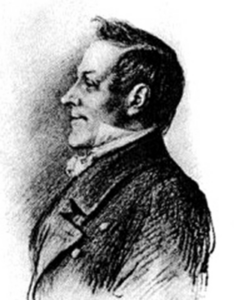In the wind
(Poet's title: Beim Winde)
Set by Schubert:
D 669
[October 1819]
Es träumen die Wolken,
Die Sterne, der Mond,
Die Bäume, die Vögel,
Die Blumen, der Strom,
Sie wiegen,
Und schmiegen
Sich tiefer zurück,
Zum tauigen Bette,
Zur ruhigen Stätte,
Zum heimlichen Glück.
Doch Blättergesäusel
Und Wellengekräusel
Verkünden Erwachen.
Denn ewig geschwinde,
Unruhige Winde,
Sie stören, sie fachen.
Erst schmeichelnde Regung,
Dann wilde Bewegung,
Und dehnende Räume
Verschlingen die Träume.
Im Busen, im reinen,
Bewahre die deinen,
Es ströme dein Blut,
Vor rasenden Stürmen
Besonnen zu schirmen
Die heilige Glut.
The clouds are dreaming,
As are the stars, the moon,
The trees, the birds,
The flowers, the river.
They are swaying
And settling
Down more deeply
Into the dewy bed,
Into peaceful spots,
Into secret happiness.
Yet the rustling of the leaves
And the rippling of the waves
Forebode an awakening.
Since they are eternally in motion,
Restless winds
Disturb and stir them.
First with a flattering agitation
Then with wild disturbance;
And space stretches out,
Devouring their dreams.
Within your pure breast
Protect your own dreams;
Let your blood flow:
Beware of the raging storms and
Carefully shelter
The sacred flame.
All translations into English that appear on this website, unless otherwise stated, are by Malcolm Wren. You are free to use them on condition that you acknowledge Malcolm Wren as the translator and schubertsong.uk as the source. Unless otherwise stated, the comments and essays that appear after the texts and translations are by Malcolm Wren and are © Copyright.
☙
Themes and images in this text:
Beds Birds Blood Chest / breast Clouds Dew Dreams Eternity Fire Flowers Going to bed High, low and deep Leaves and foliage Night and the moon Rest Rivers (Strom) Rocking Sleep Space Stars Storms Trees (general) Waking up Waves – Welle Wind
In many cultures dreams are seen as objective visions, they come from outside rather than from within the psyche of the person dreaming. In many languages there is no active verb ‘to dream’; one ‘sees a dream’ or one ‘has a dream’. Mayrhofer begins this poem with a similarly impersonal structure: ‘There is dreaming on the part of the clouds, the stars, the moon etc.’
It is a strange list. What does it mean for trees and flowers, let alone clouds and rivers, to settle down, to snuggle into bed and to open themselves to the dream world? Although there has been research on bird sleep that concludes that songbirds do indeed dream (they appear to be processing their song), the poet was almost certainly not interested in such details. He presumably just wanted to present a clear distinction between the world as it is and an alternative, better world that opens itself up to us when we can escape sufficiently from the confusions of waking life and open ourselves to visions of truth. He seems to see the world as did Plato: all of our normal experiences are distorted and we need to find a way towards perception of the world of ‘forms’ (e.g. in mathematics or philosophy), of which we only normally perceive reflections. This is the dream world.
Yet one of the most common experiences we associate with dreaming is the disjunction that shocks us at the moment of waking. ‘Oh, it was only a dream,’ we say, or, sometimes, after something intensely ‘real’, ‘Surely that can’t have been just a dream!’. The winds that can lull us to sleep (Mayrhofer writes about nature being ‘rocked’, like a child, to sleep) can all too easily build up to a storm and destroy the very visions they have encouraged. We all know this experience, too. The stresses and frustrations of the waking world tire us out and we welcome the calm offered by a night’s sleep, only to find that the turmoil we are trying to escape either prevents us from sleeping or rages in a nightmare.
Johann Mayrhofer urges us to beware of such storms and keep our dreams safe from the ravages they can inflict. Paradoxically, though, despite his presenting the dream world as something external and objective, a domain to which we should aspire, it appears that the main audience of his poem is himself. He is urging himself to uphold his artistic and spiritual vision despite the buffetting of the world around. It is not the windy weather that is putting his perceptions of truth at risk, but his bipolar personality.
☙
Original Spelling Beym Winde Es träumen die Wolken, Die Sterne, der Mond, Die Bäume, die Vögel, Die Blumen, der Strom. Sie wiegen, Und schmiegen Sich tiefer zurück, Zum thauigen Bette, Zur ruhigen Stätte, Zum heimlichen Glück. Doch Blättergesäusel Und Wellengekräusel Verkünden Erwachen. Denn ewig geschwinde, Unruhige Winde, Sie stören, sie fachen. Erst schmeichelnde Regung, Dann wilde Bewegung; Und dehnende Räume Verschlingen die Träume. Im Busen, im reinen, Bewahre die deinen; Es ströme dein Blut: Vor rasenden Stürmen Besonnen zu schirmen Die heilige Gluth.
Confirmed by Peter Rastl with Gedichte von Johann Mayrhofer. Wien. Bey Friedrich Volke. 1824, pages 118-119.
To see an early edition of the text, go to page 118 [132 von 212] here: http://digital.onb.ac.at/OnbViewer/viewer.faces?doc=ABO_%2BZ177450902


